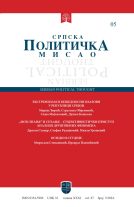- Home page
- Researchers
- Veran Stančetić
Veran Stančetić
Faculty of Political Sciences, University of Belgrade

STRATEGIES OF LOCAL SUSTAINABLE DEVELOPMENT IN THE REGION OF AP VOJVODINA – PARTICIPATION OF YOUNG PEOPLE IN CREATING STRATEGIES
The key issue of this paper is the scope of municipalities and cities of AP Vojvodina in the participation of citizens when planning local sustainable development. To find an answer to this question, the importance of sustainable development is explained first, its local dimension next, as well as the necessity of citizen participation (electronic and traditional). Then, a “surface” segment of the analysis was performed – the state of local strategies in the APV area (their existence and public availability) is analyzed, ie the tendency of municipalities and cities of Vojvodina towards strategic management and sustainable development. The second segment of the analysis is deepened, focusing on the real involvement of citizens in the creation and implementation of local development documents, with a special focus on young people (15–25 years of age) and their views on these issues. The paper presents the research findings, i.e. the perception of young people when it comes to involvement in local affairs, sustainable development, and participation in general. Although we live in an information age in which there are technological, but also formal and legal conditions for citizen participation, it is still assessed as insufficient. Therefore, the paper elaborates on the reasons for this situation and offers guidelines for improving this area. Primary and secondary sources were used in the paper. By analyzing the documents, we obtained data related to the research subject. It is primarily a qualitative analysis of primary data sources, but also an analysis of domestic and foreign relevant literature. Along with empirical research, an analysis of existing studies in this area was performed. Therefore, the method of analysis (descriptive and explanatory analysis) and the method of synthesis were used, to understand the complex whole based on the described and explained basic concepts and processes.

INTER-MUNICIPAL COOPERATION IN SERBIA - OPPORTUNITIES AND PRACTICAL SCOPE
European experiences indicate numerous forms of inter-municipal cooperation, ranging from simpler forms aimed at more efficient and rational management (such as joint local public enterprises or shared administrations) to integrative forms where inter-municipal unions are formed, possessing legal subjectivity and their own governance structure (union assembly, president, budget, etc.). The main purpose of such cooperation models is the collective decision-making on public policies and jointly management of territorial development encompassing multiple municipalities. This can serve as an alternative to formal regionalization and regional self-governance, particularly in cases where the regional level of governance is underdeveloped.
These experiences can be valuable for Serbia, considering that formal decentralization has not been embraced as an option by the authorities thus far, despite the need for regional governance, especially in the context of European integration, balanced regional development, and further democratization.
The legislator in Serbia has not yet anticipated this kind of complex or integrative inter-municipal cooperation. However, in recent years, there has been a promotion of the idea of inter-municipal cooperation (in simpler forms), which is reflected in the current Law on Local Self-Government, as well as in the initial financial incentives.
The paper initially presents the challenges of modern governance and reform directions, as well as the significance and practical scope of inter-municipal cooperation in European countries. Subsequently, the formal-legal possibilities for municipalities in Serbia to cooperate are examined, followed by practical implications and possibilities (based on European practices) that can be developed in the future.

